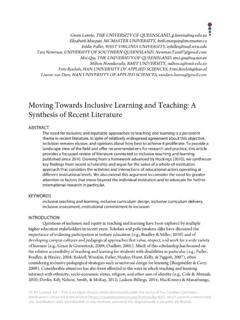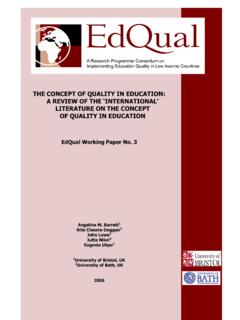Transcription of A Systematic Literature Review of 21st Century Skills and ...
1 International Journal of Instruction July 2018 , e-ISSN: 1308-1470 p-ISSN: 1694-609X pp. 1-16 Citation: Chalkiadaki, A. (2018). A Systematic Literature Review of 21st Century Skills and Competencies in Primary Education. International Journal of Instruction, 11(3), 1-16. Received: 20/12/2017 Revision: 28/02/2018 Accepted: 03/03/2018 A Systematic Literature Review of 21st Century Skills and Competencies in Primary Education Areti Chalkiadaki Autonomous University of Barcelona, Spain, The current Literature Review the discussion of 21st Century Skills in the context of primary education.
2 A sample of texts satisfying the predetermined inclusion criteria was analyzed (n=40), with the aims of synthesizing the proposed frameworks that are most cited by authors interested in 21st Century Skills and competencies in primary education (n=6) and the dimensions of the Skills and competencies mostly emphasized and researched in the particular context, according to the Literature Review research questions. The results showed a particular interest in Skills and competences related to the conditions of the information and communications technology development, globalization and the need for innovation.
3 However, a need for research focusing specifically in the context of primary education was recognized. Keywords: 21st Century , Skills , competencies, framework, primary education, INTRODUCTION Wishing to orient education towards the future, the turn of the Century found education stakeholders engaging in heated discussion over which Skills and competencies should guide 21st Century educational policy and practice. A number of frameworks were developed proposing combinations of Skills and competencies and research has been conducted approaching the topic from different perspectives.
4 The current Review is focused on the context of primary education and investigates the following research questions: - Which proposed frameworks are most cited by authors interested in 21st Century Skills and competencies in primary education? - Which of the 21st Century Skills are mostly emphasized and researched in the context of primary education? The discussion of the 21st Century Skills and competencies in primary education that develops within the context of this Literature Review is considered particularly important on the basis of the recognition of the changing conditions in the personal, social and professional life.
5 Although the world of tomorrow remains an unknown territory, it is 2 A Systematic Literature Review of 21st Century Skills .. International Journal of Instruction, July 2018 , significant that educational stakeholders are orienting their efforts to this. Given the complexity of the issue and the multiple aspects of the Skills discussed, sharing the same or, at least, a similar perception of the involved concepts can serve as the basis for a more fruitful discussion.
6 THEORETICAL FRAMEWORK Since no formal public education system existed before the 19th Century , the current educational system has been designed on a clearly defined idea of academic and professional ability that conformed with the dictations of the industrial revolution (Robinson, 2007). Conditions have changed since then, though. Globalized political, social and economic systems coupled up with competitive market rules have led to a massive growth in the knowledge generation, management industry and information communication technologies (ICTs).
7 This has had a profound effect on educational institutions, changing the conditions for policy-makers and educators and challenging concepts that are taken for granted, such as knowledge, information and ability (Zajda, 2010). Whatever the era discussed, the identity and processes of education are built based on its purposes. It is the goals set for each educational system that determine the areas held of importance, the Skills and competencies to be developed within the school practice, the beliefs that will guide the decisions, the means to be used.
8 Educational systems have four core purposes, the economic, the cultural, the social and the personal one (Robinson, 2013). Countries invest in education on the expectation that it will contribute to their long-term economic well-being and sustainability. The problem, nowadays, is that although imperatives in the world of work have changed, education has not. The IBM 2010 Global CEO Study revealed that in the business world what is held of importance today is creativity, an ability much underestimated in the conditions of the industrialization imperative ( , last access on December 15th, 2017).
9 Another aspect of education is related to deeper issues of human and social development rendered of crucial importance if a contribution is to be made to the more basic needs of a society where reorientation of priorities is an urgent necessity (Senge, 2009). This discussion over the priorities of education is not a new thing, however. Since decades ago and the first profound technical advancements scholars reflected on the danger of the world dehumanization. Back in 1972, in a period when technological progress was only starting to affect human lives, still at a very low level compared to nowadays, the Faure Report for UNESCO rang the bell that education was more utilitarian than cultural (Hargreaves, Lieberman, Fullan & Hopkins, 2009).
10 A new report published for UNESCO by Jacques Delors (1996) twenty-four years later presented four recommended pillars for the education of the new Century : learning to know, learning to do, learning to live together and learning to be. However, Zajda (2010), expresses his concern that even a decade after the publication of the report, those four concepts, and especially learning to be , remained hard to truly understand Chalkiadaki 3 International Journal of Instruction, July 2018 , and effectively apply in the classroom practice.













